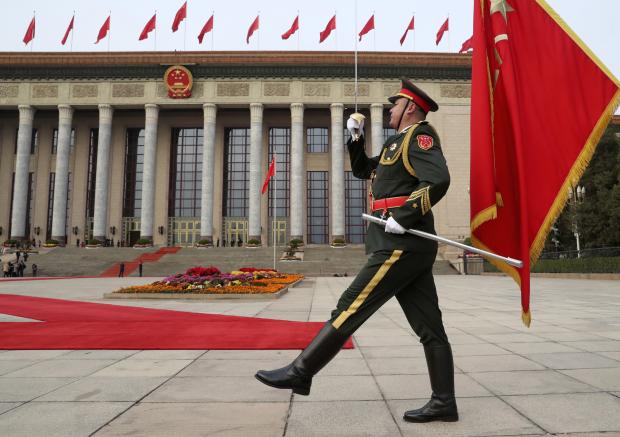Swedish arms watchdog: Global military spending up by 1.1%

In this photo, dated Thursday, Nov. 9, 2017, a member of the Chinese military marches before the welcoming ceremony for President Donald Trump and Chinese President Xi Jinping at the Great Hall of the People, in Beijing, China. According to a report released Wednesday May 2, 2018, the Swedish arms watchdog Stockholm International Peace Research Institute, or SIPRI, said Global military spending rose to $1.739 trillion in 2017, a 1.1 percent increase on 2016, China continued its upward trend, and the United States’ military spending remained constant for the second consecutive year. (Photo by ANDREW HARNIK / AP)
COPENHAGEN, Denmark — Global military spending rose to $1.739 trillion last year, a 1.1 percent increase on 2016, a Swedish arms watchdog said Wednesday.
The Stockholm International Peace Research Institute, or SIPRI, said China continued its upward trend that has lasted for more than two decades, Russian expenditure fell for the first time since 1998, and the United States’ military spending remained constant for the second consecutive year.
Presenting the report, SIPRI chairman Jan Eliasson said that “continuing high world military expenditure is a cause for serious concern,” adding that “it undermines the search for peaceful solutions to conflicts around the world.”
SIPRI said the five biggest spenders in 2017 were the United States, China, Saudi Arabia, Russia and India, which together accounted for 60 per cent of the total.
Military spending accounted for 2.2 percent of global gross domestic product in 2017.
Article continues after this advertisementNan Tian, a SIPRI researcher said that, globally speaking, “the weight of military spending is clearly shifting away from the Euro-Atlantic region.”
Article continues after this advertisementTian added that the hike in military expenditure is largely due to substantial growth in spending by countries in Asia, Oceania and the Middle East, singling out China, India and Saudi Arabia.
The institute said military expenditure in Asia and Oceania rose for the 29th successive year.
China increased its military spending by 5.6 percent to $228 billion in 2017. Its share of global military expenditure has risen from 5.8 percent in 2008 to 13 percent in 2017.
Russia, at $66.3 billion, made the largest decrease, down 20 percent on 2016.
“The military budget has been restricted by economic problems that the country has experienced since 2014,” Siemon Wezeman, another researcher with SIPRI, said.
Because of what is perceived as a growing threat from Russia, military spending in Europe increased in 2017.
Many European countries are members of NATO and, within that framework, have agreed to increase their military spending. Total military spending by all 29 members was $900 billion in 2017, accounting for 52 percent of world spending.
SIPRI noted that Poland was by far the largest military spender in central Europe, accounting for 42 percent of the region.
Romania’s military expenditure rose by 50 percent – the highest rate of increase in the world – as it started to implement a military procurement, modernization and expansion plan. Other notable increases in the region were those of Latvia and Lithuania, both of which increased their military spending by 21 percent.
SIPRI is a Stockholm-based independent think tank, partly funded by the Swedish government. Created in 1966, its research is focused on global security, arms control and disarmament.